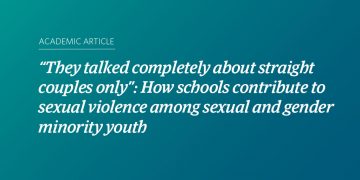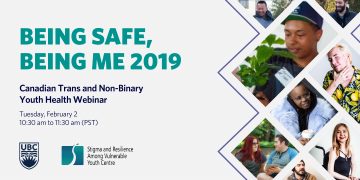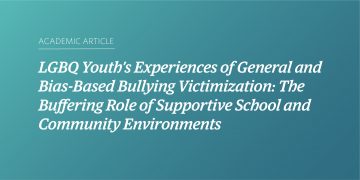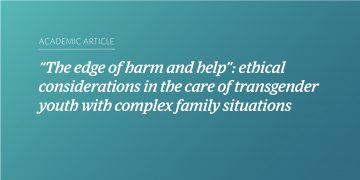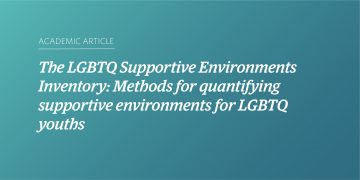“They talked completely about straight couples only”: How schools contribute to sexual violence among sexual and gender minority youth
This study examined contextual factors shaping sexual violence victimisation and perpetration among sexual and gender minority youth, with school playing a key role. Based on qualitative data from semi-structured interviews with 50 young people aged 14–26 years who self-reported sexual violence perpetration in the Growing Up with Media survey, the analysis demonstrates how schooling’s ‘hidden curriculum’ leaves sexual and gender minority youth ill-equipped to navigate the world of sexuality.
Join us for a webinar and Q&A about the links of provincial policy, IDs, and gender affirming care to trans and non-binary youth health
How is access to gender-congruent ID related to mental health outcomes? Does having a primary care provider increase access to gender affirming care and does this access change depending on the level of comfort towards the primary care provide? What is the link between Canadian provincial health services policy and access to gender affirming care? Join us for a webinar on February 2nd where we discuss the research behind these questions.
Experiences of surgery readiness assessments in British Columbia
This paper foregrounds patient experiences with surgery readiness assessments to discuss the tensions, challenges and opportunities they generate. The narratives demonstrate how much variation exists among people’s experiences of readiness assessments for gender-affirming surgery.
ÊTRE EN SÉCURITÉ, ÊTRE SOI-MÊME 2019 : Résultats de l’enquête canadienne sur la santé des jeunes trans
En 2014, et cinq ans plus tard, en 2019, les jeunes trans ou non-binaires de partout au Canada ont fait part de leurs expériences par l’entremise du Canadian Trans and Non-Binary Youth Health Survey (enquête canadienne sur la santé des jeunes trans et non-binaires). Menée par des chercheur·e·s issus d’universités et d’organismes communautaires du Canada, l’enquête comprenait des questions sur un vaste éventail d’expériences sociales et liées à la santé, ainsi que sur les facteurs de risque et de protection.
Meet Our New Managing Director
We’re pleased to welcome Dr. Ronita Nath as our new Managing Director at SARAVYC . Ronita will be leading the team to develop real world interventions and support the development of evidence-based recommendations for government, schools, and health professionals to reduce health inequities for marginalized youth.
Video resources for East Asian parents recorded in five languages
We’re excited to announce that we’ve just launched a series of video resources for East Asian parents. It’s a family guide for supporting teen sexual orientation filmed in five languages: Cantonese, Mandarin, Korean, Japanese, and English.
“The edge of harm and help”: ethical considerations in the care of transgender youth with complex family situations
Health-care providers frequently face clinical ethical dilemmas when working with transgender youth who require hormone therapy but lack parental support for this intervention. Through semi-structured interviews and grounded theory analysis, we explored ethical and clinical decision-making processes of health-care providers, as well as the health care experiences of trans youth with family discordance.
LGBTQ+ Students in Ontario: 12 Evidence-Based Facts
This fact sheet presents research findings about 2SLGBTQIA+ youth and their cisgender and heterosexual peers in Ontario, Canada, and beyond.
The LGBTQ Supportive Environments Inventory: Methods for quantifying supportive environments for LGBTQ youths
Abstract The social environment in which lesbian, gay, bisexual, transgender, and queer (LGBTQ) youths live influences health and well-being. We describe the development of the LGBTQ Supportive Environments Inventory (LGBTQ SEI), designed to quantify the LGBTQ-inclusiveness of social environments in the United States and Canada. We quantify aspects of the social environment including: (1) presence/quality […]
